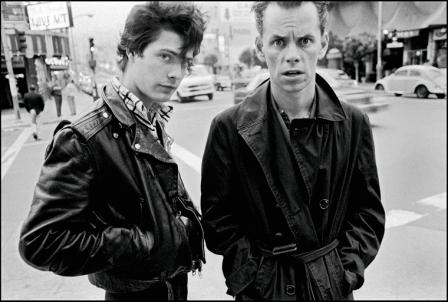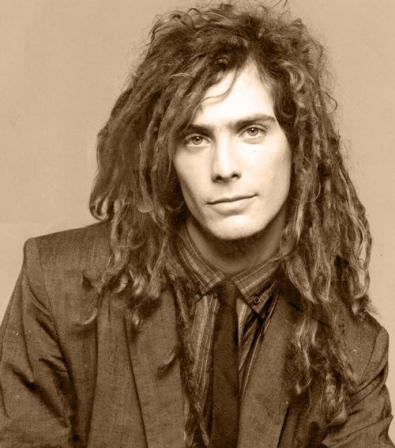Recently, I got the chance to speak with legendary Paul Roessler – producer, musician, the member of the Screamers, DC3, 45 Grave, Nervous Gender, Josie Cotton,Twisted Roots and solo artist.
In the interview for the very special anniversary Punk Globe magazine, Paul speaks about L.A. scene, The Screamers, Darby Crash and recent “Match Girl” about playing live and producing work and current work at KittenRobot Studios. Hope you’ll enjoy!
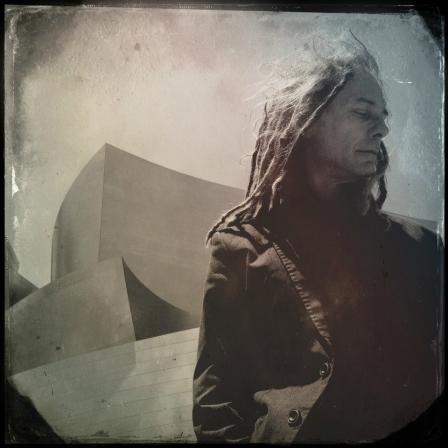
Punk Globe: This year the reissue of your debut “Abominable” came out. The record itself is very much avant-garde – tell us about and your work on it ?
Paul: "Abominable" is an instrumental album released on SST records in 1987. I guess the cool stylistic thing about it is kind of fusion of the progressive rock I was into in high school and the more Eno-ish instrumental stuff I listened to a little later. There's maybe a bit of Frank Zappa influence in there too and some really great musicians. Some of the songs were written in high school and were recorded in '86 for the album. Then there are four or five four track recordings that I made at home, weird sonic experiments. Up until now, it was only available on vinyl.
Punk Globe: You was 18, when the punk-rock scene hit big in L.A. hit and became a scene – tell us how did you discover the punk scene and how it felt becoming a part of it, when you joined The Screamers ?
Paul: I was close friends with Darby from the Germs in high school, he was really one of my favorite people. There was a clique of us that went to this weird experimental school in West LA called IPS. I also knew Pat but not as well, till later. I was deep into music already and was working with a band trying to play "the Arc" which was a 45 minute song I wrote at the end of tenth grade. I was practicing like, ten hours a day! One day, Darby said that him and Pat were starting a band and it was so off my radar...Music was all about being this super insanely schooled machine. He played me Blondie and the Ramones and I was like...uh...no. I still see those bands as basically pop bands with a twist. Influential for sure, but not something I would really listen to. I thought it was so funny that they were starting a band and couldn't play! But shortly after I heard the Sex Pistols and that was a totally different story; the intense fury really spoke to me, it was like this avante garde art; very musical in a strange new way. The first show I went to was the Germs and the Deadbeats. By coincidence, the Deadbeats were a punk band that was Zappa and prog influenced so I saw that all the work that I had done could still come in handy. I absolutely loved the Deadbeats from the start but the Germs were next level. What happened in between the songs was more important than the songs! I knew that rock music, which had become absolutely awful, was relevant again. I felt like I had discovered the living breathing state of the art. Adding the Screamers, the Weirdos, the Dickies, Black Randy, X and a bunch of other bands just solidified that I had stumbled into something really special. To this day, I love the LA punk scene more than the English or NY punk scene, although I have to admit that that is probably not an objective assessment.
Punk Globe: With The Screamers, you got the reputation of one of the most amazing bands in L.A. – what made playing in thr group so special for you ?
Paul: Well, I joined the Screamers and they were already fully evolved, so I don't take any credit for helping to design that band; the work was already done. For me at 18 years old, it was about growing up fast and learning a skillset that was totally foreign to me. I was a very old-fashioned musician/artist when I joined the band, focused on technique and harmony and rhythm. The Screamers were very much out of the Andy Warhol design-a-human school. They wanted you to "become a Screamer," which was a very tall order for me, and it wasn't really explained very well. I really had to pick it up by osmosis, if I ever really did. There was plenty of rebellion in me too; I wasn't about to just go along with things. So if they were listening to Kraftwerk and Nino Rota, I was discovering Jimi Hendrix and being a part of the Germs cult. They were constantly "putting me on probation."
That said, the Screamers were simply one of the most stunning live experiences you could imagine. Every single show we played, I felt like I was in one of the greatest bands in the world. Up until the last period where they added violins and backing tracks and silly direction from Rene Daalder. I wasn't against any of those ideas, the band just got way worse.
It was my first experience with touring, my first experience with a trace of fandom and feeling like I was really succeeding in the world. And the three other members taught me so much. They were all 6-10 years older than me, with so much life experience. And all three of them brilliant and unique in different ways.
Punk Globe:To a certain point, I must say that bands from the L.A. scene kept on carrying this punk-rock banner – inspired by groups like Ramones ,The Stooges or The Sex Pistols with The Damned. How important for you was that king of punk-rock-sound ?
Paul: It would probably be cooler to say that it wasn't as important as it was, but it became and remains pretty central to my identity. There is a LOT of room for interpretation of what that means though. There's been a lot of discussion trying to define what "punk rock attitude" is. I wouldn't want to dip into that subject too much other than to say maybe that I never, ever think of punk rock as "dumb." When people embrace stupidity because they think it's "punk rock" it really depresses me.
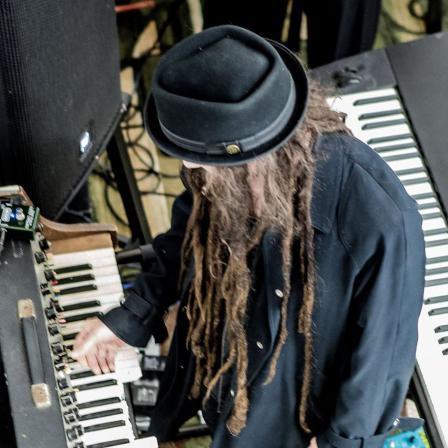
Punk Globe: Getting back to your work on ‘The Arc” – tell us, what was your motivation behind this record and what defined the sound on this record ?
Paul: Well it's important to make the distinction between the composition of that album, which happened in 1975, and the recording of it, which happened in 2012. When I wrote it, I was heavily influenced by Jethro Tull, Yes and Emerson Lake and Palmer, and I had just had my head crammed with a bunch of music theory so it just poured out. It isn't stylistically highly original. I don't think. It's a bit by the numbers even. But I was 16!
I had considered it lost forever; punk rock seemed to have killed that genre and even made a joke out of it. But in 2012 I had time and a studio and I started recording it, just to see what that would be like. Once I started recording it, it was kind of like writing it...I had to get to the end. Even if it took 750 hours haha.
In the recording, I was definitely conscious of bringing influences to bear from the last forty years rather than being true to the sound of 1975. I sort of had to, because I was playing all the instruments, but I consciously wanted to bring a punk/NIN/Eno/PIL flavor to it to try to make it cooler.
Punk Globe: Since the breakup of The Screamers you joined bands . Starting with 45 Grave and DC3 and finishing with Dead Kennedys Redd Cross and TSOL. While working with someone as producer or collaborator – do you always have the same set of goals with each group ?
Paul: Yeah I guess so: make it as good as possible. Everyone's idea of "good" varies a bit. I have a certain aggressiveness that feels right to me. There are definitely notes that I will like sometimes that other people consider "wrong." I also feel like things sound okay before it gets as polished as most of the stuff on the radio. I have a bit of Jackson Pollock in me. I like splatters and sketches. Also every time you enter into something like this there are lots of limitations you have to work within. I have rarely had $100,000 budgets to work with. So there's a lot of "think on your feet," and "that'll have to do." Or:"that was the first take but there was a magic about it" and to remember to go back to that first take after you've tried to top it. And have passion and focus and enjoy it. Believe that what you're doing matters, is important.
Punk Globe: But at the same time, while writing music it’s obvious that each band has its specific sound. What helps you to define how you should add to the band ? As collaborator.
Paul: A lot of it is intuitive. You just throw out ideas and see what the collaborator responds to. Sketch it in. Nothing is carved in stone. It's really important not to get bogged down, I think. And there has to be trust. So I'm constantly saying "that's great!" Because people could have sat in on Beatles or PIL or Meat Puppets...basically any session that has ever happened and said: "That's shit. I've heard those chords a million times." And the whole thing grinds to a halt and becomes leaden and miserable. All the things you love are built out of very simple ideas. And if you get to the end and it's crap, oh well! You were crap that day! But that is so rare for me. Usually, if the process is exciting, the end result is pretty exciting.
Punk Globe: Starting with your work on Nina Hagen records you was focused on production side of things. Was there a moment when you decided to take a producers’ seat or everything happened gradually ?
Paul: I started making four tracks in my room and going into fancy studios to work with bands that I played with. In the 90's I got 8-tracks. I'm pretty sure the Beatles never had more than 8 tracks. At the end of the 90's Josie Cotton and Geza X let me start working in their studio which had ProTools, the same system I work on today. A real studio! I think that most of the decisions I have made in my life were so that I would someday have lots of access to a studio haha. The last twenty years I have been recording pretty much constantly, either my own stuff, or someone else's.
Punk Globe: You said once that your parents taught you to take the risks. And as artist, you keep on doing it. Changing something while playing live, or adding bits and pieces of different parts – like Mike Garson does. While working on production side of things – is it important to take risks, what do you think ?
Paul: I can't say risk taking is a huge part of what I'm thinking. Or maybe it's ALL risk taking. I'm just going for something I think is great. To some people, what I think is great is insane. They think I'm taking risks. Not exactly. There is an element of risk at every junction of the recording process. If I focused on it, it would make me very nervous.
Punk Globe: Most of your work now take place at Kitten Robot Studio – you co-founded with the fabulous and talented Josie Cotton. Tell us a little bit about the studio, what your current\recent projects have been ?
Paul: This is the third studio Josie has been a partner in. City Lab in Hollywood, Satellite Park in Malibu and now Kitten Robot. I have had a bigger role in each. Now it's just me and her.
We built it in 2011. In the beginning it was kinda slow; I had time to record the Arc and 6/12... but it got busier and busier till for the last five years at least I've worked like a freak. It's too big to be a "home studio" but not a big pro studio like the ones I recorded on in the old days. It's very comfortable and the decor is silly and cool. It is less expensive than those big studios. I like it to be affordable to most anyone. I am very fast. I can record an album in a weekend if that's all someone can afford. I'd prefer not to, but some of all of our favorite albums were recorded like that, so it is possible. It is very very common that people return and make multiple albums.
I'm going to list some bands and artists, and will kick myself later for people I have forgotten, but it would be the whole interview.
Harry Cloud, Egrets on Ergot, Prissywhip, Crow Jane, Josie Cotton, TSOL, Rikk Agnew, Gitane Demone Quartet, Savannah Pope, Cherish Alexander, Tombstones in their Eyes, Phideaux Xavier, Moon Bandits, Pat the Bunny, IGAF Sequoia, the Nymphs, The Deadbeats, James Williamson, Jason August Mann, Kira, Fancy Space People, the Balboas, Kurt Schellenbach, John Curry, the Two Tens, Orphan Goggles, Terminal A, Lords of Altamont, Zolar X...trust me, that is not half of them. I'm probably choosing these because all of them have done multiple albums with me.
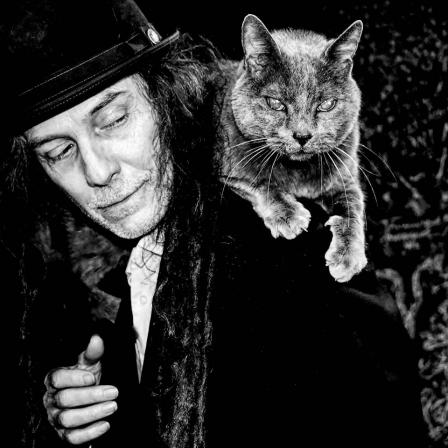
Punk Globe: When we spoke for the last time, you noticed that nowadays, you feel yourself as a part of completely different musical scene. What can you say about music scene in L.A. currently ? Any favorite artists you may recommend our readers ?
Paul: There is a community of artists that record here, focused more on recording than live shows. Many of them do play live, but I think we are fulfilling a lifelong dream of many musicians: to record albums. In old scenes it was hard to do; you needed a record company or tons of money and you really needed someone who "got" you and helped you realize your vision in the studio. That's what we do. It's very addictive. Some people, unbeknownst to them, were playing all these shows so that someone would let them make albums. Thanks to technology, if making albums is your heart's desire, you can skip right to that. And for most of us, holding that finished vinyl or CD or just looking at our bandcamps is a very satisfying feeling. And the process is...well spiritual in a way in the sense that it feeds the spirit. I am using medieval language and metaphor, but I think you know what I mean. Creativity is like a form of meditation. I think they talk about it in Zen.
Punk Globe: With your recent – “Match Girl” there were a certain life-circumstances pushed you to start writing this record. Is it always important for you to have an idea in the core of the record ?
Paul: No, but it is important AFTERWARDS that the songs hold together in some kind of story. And they almost always do. Writing songs was always sort of like journaling for me, so after I would write ten or twelve songs there would be a chapter of my life staring back at me. The Arc was mapped out before I did it, 6/12 was a decision to record an album in a month as a relationship was dissolving. Match Girl was written over a few years. I couldn't see the big picture of the story that the songs were telling, but it sure is obvious now. Abominable were random instrumental pieces but they hold together somehow with a unifying identity. The "album" was an artform created in the 60s that some of us who were growing up then take very seriously. For most, it is an obsolete artform. Oh well.
Punk Globe: Playing and releasing material through the years, you used to pass through serious of musical phases. Whether it’s “Match Girl” or DC3 or quite avant-garde “Abominable”. In what way your approach being changing over the years, and in particular - what can you say about it ?
Paul: You are seeing my career from the outside. From the inside, opportunities arise and I take them. I have been in the right place at the right time, and I have said "yes" a lot.
I am producing more and writing less now, that's for sure. I mean I am 60 after all. I was so surprised when I composed "Galatea" a couple of years ago, a 21 minute song based on a book by Richard Powers. I thought I had put all my creative energy into all these bands I record, but there it was.
And I have a new album, basically finished that I'll put out at the end of this year. I'm not sure how it's really that different in the way it's created. I know that it's more preoccupied with death than love so that's different. I wrote so much about relationships for a while there, I have noticed that now that I am in a very happy marriage that I'm finding other things to write about. Philosophy, science, politics. Very dangerous stuff to address because it can really come out terrible and embarrassing. It's a bit easier to sing about "my baby left me and I have the blues." Just howl in pain and you have some real passion and emotion. Bringing deep emotion to a subject like AI would seem impossible, wouldn't it? But somehow, I feel like "Galatea" managed to do it against the odds. The story is about a computer waking up and becoming conscious. As I composed, the voice of this sentient AI began speaking through me and saying much wiser and more loving things than I ever could have created myself.
So if you ask me my approach, a large part of it is to set up a complex system that generates surprising results. Any time humans come together you have a complex system. I have studied complex systems a little and have a bit of a feel for them. Linear, bell-curve systems are comfortable but not as interesting. "Galatea" is about that also: "All these hard lines that make us feel safe / All these soft curves we want to set straight." Natiue is curvy and blurry and you have to be comfortable with it. This is how I see everything, and it's how I make music.
Punk Globe: Would you like to wish Punk Globe a Happy Anniversary?
Paul: Happy Anniversary Ginger and all at Punk Globe.
